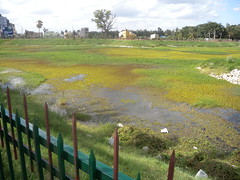Urban Water
The sanitation crisis in India - An urgent need to look beyond toilet provision
Posted on 18 Apr, 2012 12:14 PMGuest post by: Aarti Kelkar-Khambete
Image Courtesy: Wikimedia Commons
The sanitation crisis and the recent evidence on lack of toilet facilities
Toolkit for integrated urban water management, developed by Institute for Resource Analysis and Policy
Posted on 12 Apr, 2012 11:24 PMThe review included, but was not limited to urban hydrology, management of water supply infrastructure, water resources management, water quality management (WQM), groundwater management, technical and economic instruments for water demand management, technical and economic aspects of leakage reduction, environmental and economic aspects of wastewater treatment and reuse, storm water management
Climate change and water sources: Strengthening community preparedness and water use regulations hold the key
Posted on 10 Apr, 2012 10:34 AMAuthor : Neelima Garg
Water law in a globalised world - Philippe Cullet discusses the need for creating a new framework
Posted on 09 Apr, 2012 11:09 PM1. Introduction
Maps, lakes and citizens: The use of surveys in lake conservation - An article in the Seminar magazine
Posted on 19 Mar, 2012 11:44 AMThis lake system is now decaying with lakes either taken over for urban uses, or choking due to neglect. ATREE and the Bruhat Bengaluru Mahanagara Palike (BBMP) have been engaged in attempting to understand how to restore these lakes for urban use, while maintaining their ecological importance. This article in Seminar describes this attempt.

Draft National Water Policy (2012) fails to take into account the multiple, complex problems and issues relating to water in India says M S Vani
Posted on 18 Mar, 2012 05:49 PMGuest post by: M S Vani
Perusing the draft, one comes across all the ‘right’ concepts, words liberally sprinkled throughout the document, describing the resource:-
- Natural resource
- Hydrological cycle
- Ecological needs of rivers
- Climate change
- Sources pollution
and our intended response to it :-
Status of water supply in in class-I cities and class-II towns of Uttar Pradesh (UP)
Posted on 17 Mar, 2012 10:15 PMSource: Central Pollution Control Board’s 2009-10 Report
Class of cities/towns |
Integrated water management for rural/urban India: Common effluent treatment plant can conserve fresh water in industrial estates
Posted on 17 Mar, 2012 11:02 AMAuthors : Vasudevan Rajaram and John R. Sheaffer
Lessons for rural water supply - Assessing progress towards sustainable service delivery - India - IRC International Water and Sanitation Centre, The Hague
Posted on 10 Mar, 2012 04:24 PMThe study looked beyond a simple description of the situation towards broader processes of decentralisation and political leadership, in an attempt to unpack what has gone right or, as in many cases, what has gone wrong, within the rural water sub-sector.



